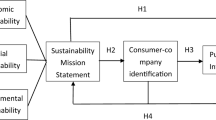Abstract
In the present, brands are seeking new ways to engage with customers (Ind et al. 2013). They listen to their brand communities and ask questions to customers to test their offerings (Füller et al. 2008; Gouillart 2014) since consumers are increasingly seeking solutions to their concerns to create a better world. Likewise, they make their purchase decisions guiding by their moral values (Hollenbeck and Zinkhan 2010). Hence, they push companies to carry out corporate social responsibility (CSR) practices (Iglesias et al. 2018). On the other hand, some studies also showed that consumers demonstrate closeness to brands that care about well-being, security, equality, and respect (i.e., Shaw et al. 2005). In other words, consumers’ choices may depend on their higher-order needs for social, economic, and environmental justice (Kotler et al. 2010). Environmental sustainability is one of the ethical actions that companies should perform and many firms noticed the importance of it and give importance to their CSR activities to get a competitive position by helping to preserve natural resources, minimize waste, and reduce emissions (Krause et al. 2009).
This paper focuses on the relationship between environmental sustainability perception and different consumer behaviors such as consumer loyalty, satisfaction, and purchase intention: it considers this relationship in the light of moderating effect of price. Environmental sustainability actions can positively encourage consumers’ attitudes. However, sustainability practices can increase the cost of operations, and it may lead organizations to charge a higher price for their goods and services. Therefore, the price may have a moderating effect between these different consumer attitudes and environmental sustainability actions of the companies. In this research, the Social & Exchange Theory was implemented. This theory provides to measure the cause-and-effect relationship between sustainability practices and different consumer attitudes. On the other hand, a quantitative research technique was conducted to test the relationship between these variables through an online survey. The survey methodology was conducted to test the hypotheses and it was distributed to 454 random participants regardless of their functions, ages, and genders to make a heterogonous composition from Istanbul, Turkey. The findings confirmed the positive relationship between environmental sustainability actions and consumer attitudes. Besides, it also confirmed that price has a moderating effect between these actions of the companies and consumer attitudes. This research shows that consumers care about environmental issues as long as the price is reasonable. Likewise, firms need to consider the optimal price level by conducting environmental sustainability practices to get a competitive position in the market.
Access provided by Autonomous University of Puebla. Download conference paper PDF
Similar content being viewed by others
Keywords
- Environmental sustainability
- Consumer loyalty
- Consumer satisfaction
- Consumer purchase intention
- The price effect
In the present, brands are seeking new ways to engage with customers (Ind et al. 2013). They listen to their brand communities and ask questions to customers to test their offerings (Füller et al. 2008; Gouillart 2014) since consumers are increasingly seeking solutions to their concerns to create a better world. Likewise, they make their purchase decisions guiding by their moral values (Hollenbeck and Zinkhan 2010). Hence, they push companies to carry out corporate social responsibility (CSR) practices (Iglesias et al. 2018). On the other hand, some studies also showed that consumers demonstrate closeness to brands that care about well-being, security, equality, and respect (i.e., Shaw et al. 2005). In other words, consumers’ choices may depend on their higher-order needs for social, economic, and environmental justice (Kotler et al. 2010). Environmental sustainability is one of the ethical actions that companies should perform and many firms noticed the importance of it and give importance to their CSR activities to get a competitive position by helping to preserve natural resources, minimize waste, and reduce emissions (Krause et al. 2009).
This paper focuses on the relationship between environmental sustainability perception and different consumer behaviors such as consumer loyalty, satisfaction, and purchase intention: it considers this relationship in the light of moderating effect of price. Environmental sustainability actions can positively encourage consumers’ attitudes. However, sustainability practices can increase the cost of operations, and it may lead organizations to charge a higher price for their goods and services. Therefore, the price may have a moderating effect between these different consumer attitudes and environmental sustainability actions of the companies. In this research, the Social & Exchange Theory was implemented. This theory provides to measure the cause-and-effect relationship between sustainability practices and different consumer attitudes. On the other hand, a quantitative research technique was conducted to test the relationship between these variables through an online survey. The survey methodology was conducted to test the hypotheses and it was distributed to 454 random participants regardless of their functions, ages, and genders to make a heterogonous composition from Istanbul, Turkey. The findings confirmed the positive relationship between environmental sustainability actions and consumer attitudes. Besides, it also confirmed that price has a moderating effect between these actions of the companies and consumer attitudes. This research shows that consumers care about environmental issues as long as the price is reasonable. Likewise, firms need to consider the optimal price level by conducting environmental sustainability practices to get a competitive position in the market.
Author information
Authors and Affiliations
Corresponding author
Editor information
Editors and Affiliations
Rights and permissions
Copyright information
© 2022 The Author(s), under exclusive license to Springer Nature Switzerland AG
About this paper
Cite this paper
Erdogan, G., Andreu, J.L., Amo, M.d.C.A.d. (2022). Consumers’ Environmental Sustainability Perceptions on Their Attitude: The Moderating Effect of Price: An Abstract. In: Allen, J., Jochims, B., Wu, S. (eds) Celebrating the Past and Future of Marketing and Discovery with Social Impact. AMSAC-WC 2021. Developments in Marketing Science: Proceedings of the Academy of Marketing Science. Springer, Cham. https://doi.org/10.1007/978-3-030-95346-1_22
Download citation
DOI: https://doi.org/10.1007/978-3-030-95346-1_22
Published:
Publisher Name: Springer, Cham
Print ISBN: 978-3-030-95345-4
Online ISBN: 978-3-030-95346-1
eBook Packages: Business and ManagementBusiness and Management (R0)




